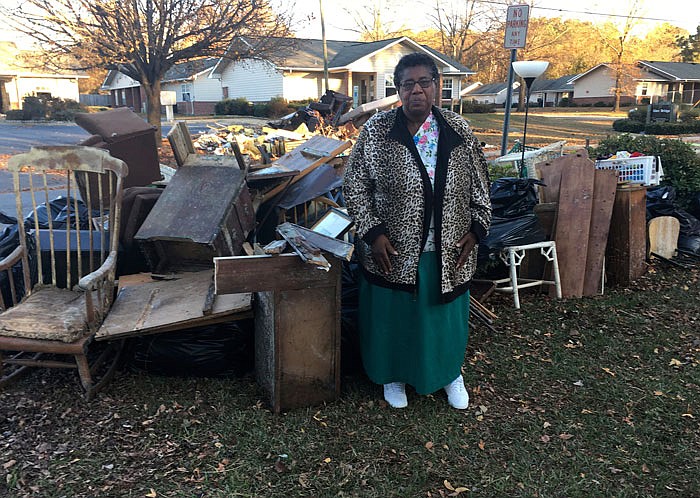PRINCEVILLE, N.C. (AP) - When Dianne Hines pulls up to her flood-damaged home in Princeville, she has no interest in going inside.
Her ruined furniture, books, pictures and other belongings lie stacked at the curb, left there by volunteers with Samaritan's Purse. They've placed family photos that might be saved on the porch. Glassware, a girl's pink-and-blue bicycle and a walker sit outside.
Hines doesn't even go on the porch; she doesn't want to live there again.
The small, one-story house was built on the same spot as her previous home after Hurricane Floyd knocked the old structure off its foundation in 1999. Now that Hurricane Matthew has made her rebuilt home unlivable, the 63-year-old domestic worker is ready to move away from Princeville altogether.
"I feel like it's time to make a change," she said.
That decision, however, doesn't entirely rest with her, or with hundreds of other Princeville residents who might consider moving after the October storm.
Instead, under Federal Emergency Management Agency rules, the four-person town council will vote soon on which of three options to offer homeowners: elevate homes, repair damaged homes or let FEMA acquire the homes of people who want out. FEMA would demolish those homes and turn the land into green space that can never be built on again.
And there's the rub for a small town with an annual budget of less than $1 million: Princeville would be devastated, if not lost entirely. Green space is un-taxable property, which hurts Princeville's bottom line, and the town will have to maintain that property, too.
"Our tax base is already small, and if we allow people to leave and they will never be able to come back to that property, then we'll never be able to bring more citizens in," Mayor Bobbie Jones said at a meeting in early December where locals learned about the options.
A state Division of Emergency Management spokeswoman says she's unaware of any other governments wrestling with the decision.
There are approximately 750 single-family homes in Princeville, a town of about 2,200 on North Carolina's coastal plain.
Town manager Daniel Gerald said 241 homes had major damage and 229 others had less severe damage.
Settled at the end of the Civil War by freed slaves - the first town in the U.S. incorporated by African-Americans - Princeville is still almost entirely black and has a per-capita income less than half the national average. The entire town is in a flood plain, and has repeatedly flooded over the years, according to the Army Corps of Engineers.
State historians say there's some evidence white landowners encouraged the freed slaves to stay on that swampy, unusable land, away from the white residents of Tarboro just across the Tar River.
After Hurricane Floyd struck in 1999, city officials rejected an "all or nothing" federal buyout. Instead, the council wanted to keep the town intact and use the federal money to extend and improve the town's protective dike.
Those improvements still haven't been made, Jones said. A March 2014 report from the Army Corps of Engineers outlines multiple studies that have been done on the project over the years. It says the Corps had permission in 2012 to move forward with its preferred plan with an estimated cost then of $21 million.

